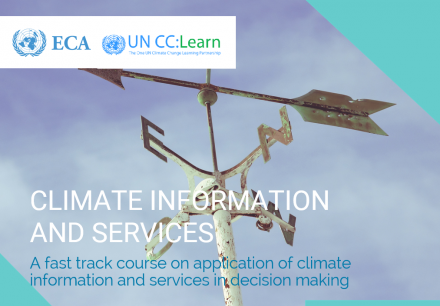
Climate Information and Services
UN CC:Learn Partnership, United Nations Economic Commission for Africa (UN ECA)
IMPORTANT: Please register directly on the course website: http://unccelearn.org/
This e-tutorial introduces climate information and services and their application in decision-making. It has been developed by UNITAR in collaboration with UNECA’s African Climate Policy Center (ACPC) and the Pan-Africa component of the Weather Information Services for Africa (WISER) program, kindly supported by UK’s Department for International Development (DfID).
It is based on the WISER toolkit “Mainstreaming/Integrating Climate Information and Services into Legislation, Development Policies, Plans and Practices”, and has been tailored to the needs of busy professionals in national, regional, and local governments and other relevant stakeholders.
After completing this e-tutorial, participants will be able to:
- Define climate information and services.
- Identify the uses of climate information and services in development planning and policy.
- Discuss the role of legislation in strengthening climate information and services.
- Provide examples of instruments available to governments for mainstreaming climate information and services.
The course is structured by three sections:
- What are climate information and services (CI/S)?
- What is the role of CI)S in development and policy?
- How can decision-makers strengthen CI/S and their use?
UN CC:Learn is a partnership of more than 30 multilateral organizations supporting countries to design and implement systematic, recurrent and results-oriented climate change learning. At the global level, the partnership supports knowledge-sharing, promotes the development of common climate change learning materials, and coordinates learning interventions through a collaboration of UN agencies and other partners. At the national level, UN CC:Learn supports countries in developing and implementing national climate change learning strategies. Through its engagement at the national and global levels, UN CC:Learn contributes to the implementation of Article 6 of the UNFCCC on training, education and public awareness-raising, and the 2012-2020 Doha Work Programme. Funding for UN CC:Learn is provided by the Swiss Government and UN partners. The Secretariat for UN CC:Learn is hosted by the UN Institute for Training and Research (UNITAR).

